Finding True Roots in a Fake World
Slovenian musician Igor Leonardi talks with Heather Henderson about his Fake Orchestra
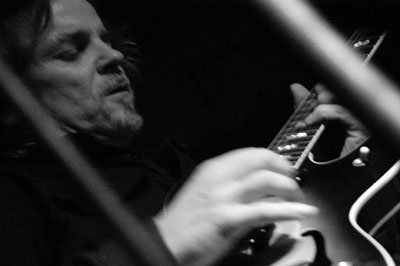
The cover of Fake Orchestra's new CD Fake World shows a smiling golden elephant romping across a tangerine sky, blowing stars
from his trunk. Elsewhere on the cover are mermaids, biped UFOs, fish carrying buildings on their backs,
and monkeys wearing red sneakers. The paintings are by Belgrade-based artist Dragan Radović, and they are a perfect illustration of the band's music: colorful, festive, comic, a strange but beautiful surrealist dream.
Their first album, Fake Life, is a live recording from the 2001 Cerkno Jazz Festival in their native Slovenia. There, they have their avant-garde-jazz hats on, performing Ornette Coleman and Don Cherry compositions and throwing in a bit of Bach and Bartok along the way. In Fake World, they show another side, presenting their own take on "world music". Added to the powerhouse instrumental lineup are singers Ana Vipotnik and Janja Majzelj, who perform versions of traditional songs from Slovenia, Croatia and Bosnia, a few originals composed by band members, and a couple of standards. But nothing is ever "standard" in Fake's world – for example, "Que Sera Sera" (listen) is done in a bright new way (think: Doris Day meets Afropop).
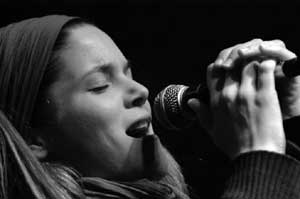
Ana Vipotnik |
The group's versatility and defiance of convention make it impossible to categorize them. "That's why we call the band Fake Orchestra," says guitarist and bandleader Igor Leonardi. "Because we play all these styles, it's not really one band."
Fake began as a jazz ensemble. How did folk music get into the mix? "It came spontaneously," Leonardi says. "Every member of Fake Orchestra brings their own ideas and their own repertoire. Ana, our singer who does the Slovene songs, was taught these traditional songs by her father. Our other singer, Janja, is an actress - she sings more cabaret and Latin stuff, meaning Spanish, French, Italian songs. Jelena [Ždrale], our violinist, has Balkan roots - she is from Bosnia - so she brought these Bosnian songs and Macedonian songs, of which we also have quite a few. So that's how this record came about. This is kind of a compilation of what was happening over a period of five years. It was very hard to decide which song of each style to put on, because we could have a whole album of Slovene songs, Macedonian songs, or cabaret songs."
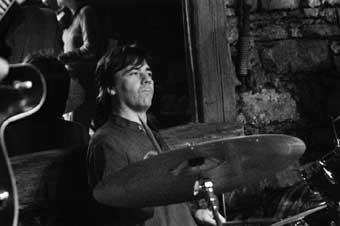
Aleš Rendla
|
Track number 9 (listen) on the album, a medley recorded in front of a live audience during a radio concert, is an example of Fake's freespirited eclecticism: it begins with a Turkish theme, then the Sicilian song "Sole" is overlaid on the Turkish rhythm. This is followed by a Bosnian folk song, "Mostarski Dučani," and accelerates into the high-energy "I Remember Begnagrad," written by Aleš Rendla, the band's drummer. Somehow all the pieces fit together – indeed, they seem as if they were meant for each other.
"It's kind of like a collage," explains Leonardi. "When we play live, we go from one song into another, mixing different styles and rhythms and melodies. We put them together and we add harmonies. We try to mix it all up, but still keep all these elements as they originally are, and not adapt them one to another too much."
A trademark of Fake's style is their sense of humor. In "Po Polju pa Rož'ce Cvetejo" (listen), the vocalists mimic scratchy field recordings of folk singers, with birds twittering in the background, before swinging into a sunny pop arrangement with an irresistible groove. "Stara Baško" is a folk song about a place on the Croatian coast from which you can see America. But before they get to this part, the band goes through an extended jam based on War's "Cisco Kid," with peculiarly Slovenian versions of the lyrics: "Druže [Comrade] Tito was a friend of mine," and the disclaimer, "He was just a friend!"
One of Leonardi's compositions, "Život ja Ljep" (listen) is a lazy, mellow ballad that he says is a parody of Cuban son, laced with quasi-Spanish words – "Esperanto Spanish," he laughs. Leonardi's lyrics refer to famous Yugoslavians Nikola Plečaš, a basketball player from the world championship team in the early ‘70s, and Lidija Sentjurc, a Communist politician. He translates: "‘Life is beautiful, but there are so many of us, we are in such great numbers. Plečaš is not as good as he was under the basket, he's not as good anymore. Lidija, your mustache has grown. I can say nothing else, but life is beautiful.'"
Since the 1980s, Leonardi has been a prolific composer of music for Slovenian theater and film productions – "from A to Z, including all the orchestration," he says. His score for the film Spare Parts won the prize for the best Slovenian film music last year, and he has more projects in the works with the film's director, Damjan Kozole. But with Fake's growing popularity at home and abroad – the band recently gigged in Ireland - Leonardi has had to prioritize. He says, "For now, I've put aside theater music so I'll have more time to concentrate on the band and bring us to another level, so we can play and tour more."
The African flavor of many of the arrangements was inspired by Leonardi's travels in Africa, visiting Burkina Faso, Togo, Ghana, Ivory Coast, and Niger. He came away from the experience with a deep respect for African music. "There I saw and heard the roots of jazz, especially on these balafons, which are marimbas. Some of them have pentatonic tuning, others have regular diatonic scale. In these pentatonic tunings - this is the basis of blues, with these blue notes – the way they were phrasing these melodies were just like some phrases that I had heard in jazz."
Leonardi also found an important influence in the United States, where he lived for a long time. "I went there first for just two months, as a part of a summer holiday to go check out the jazz scene," he says. "I happened to stay there for eight years. I met some other musicians, and started playing right away." In a workshop at a San Francisco art event, he met Don Cherry. Cherry had been a sideman of Ornette Coleman's and had helped to pioneer "free jazz". He had traveled widely throughout the world and was one of the first to use ethnic instruments in jazz. In that first meeting, he and Leonardi jammed together on African instruments – Leonardi on kalimba and Cherry on the doussn'gouni.
The friendship that grew between them gave Leonardi a new perspective. He recalls, "Don gave me this looseness about playing music - that you are allowed to do anything you want, you are free to move within the musical material. It doesn't always have to be the way the rules tell you. If you know the rules, then you can break them. He was childlike, in a way, very playful. With music and art, you have to be playful. And he also taught me how to incorporate silence into the music – how to leave space, and breathe, and let the music speak."
Cherry taught Leonardi about harmolodics, Ornette Coleman's theory of music. "It incorporates rhythm, melody, and harmony at the same level," Leonardi says. "It means that all three are equally important and it allows for free improvisation within a jazz form. There's a lot more to it, but basically Don explained that Ornette's theory helps you find your own sound - it allows you to play with your own sound."
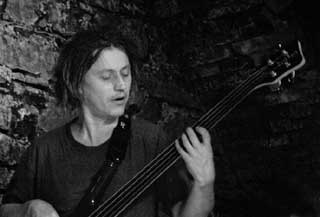
Nino de Gleria
|
When Leonardi was forming an ensemble to explore these new influences, he turned to bassist Nino de Gleria and drummer Aleš Rendla. They had studied jazz together in Graz, Austria, in the days before jazz instruction was available in Yugoslavia. They played with Leonardi throughout the 80s, first in Begnagrad, the innovative group founded by accordionist Bratko Bibič (their 1983 album Begnagrad was re-released last year) and then in the jazz-rock band Quatebriga. Besides playing together in Fake, they frequently perform as a power trio and will be releasing an album soon.
Leonardi says of his drummer and bassist, "They're extremely good musicians, and our styles of playing our instruments are really compatible. Aleš is very exact, very precise, and has such a vast knowledge of his instrument that he can just play anything - and he's not just playing a rhythm or a groove, he's playing the whole sound. He's playing melodies on the drums, he's playing multiple rhythms - he can play like two drummers at the same time. Nino is not as technically oriented – he has his own ideas and approach to bass playing. He's not thinking in terms of theory. He's more impulsive, and he will just play the weirdest, most unexpected stuff, which nobody else could play."
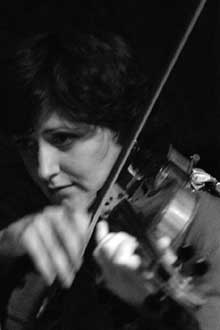
Jelena Ždrale
|
The other members of the Fake Orchestra are violinist Jelena Ždrale, percussionist Blaž Celarec, and Primož Fleischman on saxophone and flute. Leonardi says, "Jelena started out as a classical musician playing with us and some other bands, and she has developed a unique style now – she can play any type of music and you can recognize that that's her. She's singing too, mostly background vocals. Blaž is really into Latin, especially Cuban, music. He travels there and studies and plays with Cuban musicians. And then there is Primož, who is a virtuoso. He studied saxophone at Berklee in Boston. He has also studied at the classical academy here, and he's a teacher of saxophone."
In some concerts, the orchestra features guest artists. Some perform on Fake World, including accordionist Drago Ivanuša, trumpeter David Jarh (formerly in Quatebriga), and Boštjan Gombac, clarinetist and singer for the well-known Slovenian band TerraFolk. His forceful vocal antics add razzle-dazzle to Fake's version of "Fly Me to the Moon". "It's a great privilege to have so many musicians that you can just call up and tell them, ‘OK, come play,' and nobody will ask you what the fee is," Leonardi says. "This spontaneous development – we've been able to maintain it, and it has come to fruition now."
Despite the fact that the band is so large and includes musicians from such different backgrounds, he says it's not hard for them to find common ground. "All these people that are in the Fake collective are here for the reason of music. It's for the love of the music, and for the love of having fun, and just being together and improvising. We are always improvising."
True to his jazz roots, Leonardi finds improvisation to be one of the most gratifying elements of playing music. "When you improvise, something unpredictable happens," he says. "Your inspiration can take you anywhere. You can play melodies you have never heard before. When you play them, maybe a few milliseconds before the audience hears them, you hear them in your head. That's when you feel that you are at one with something that's beyond you. It's so spiritual sometimes, and refreshing. You are discovering new things, and it fulfills you. You feel at one with the world, which we humans need. We always need to belong somewhere, to feel that we are not all alone in the universe."
All photos are ©2004 Marjan Laznik
You can read interviews with some other members of the orchestra at Beat-a-go-go
Fake Orchestra CDs are available from cdRoots
|



